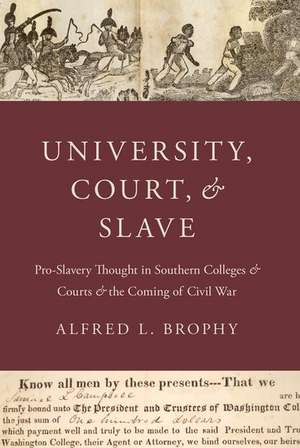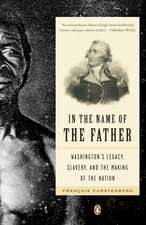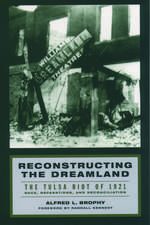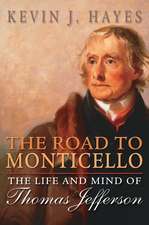University, Court, and Slave: Pro-Slavery Thought in Southern Colleges and Courts and the Coming of Civil War
Autor Alfred L. Brophyen Limba Engleză Paperback – 8 oct 2019
| Toate formatele și edițiile | Preț | Express |
|---|---|---|
| Paperback (1) | 204.71 lei 3-5 săpt. | |
| Oxford University Press – 8 oct 2019 | 204.71 lei 3-5 săpt. | |
| Hardback (1) | 331.04 lei 10-16 zile | |
| Oxford University Press – 7 sep 2016 | 331.04 lei 10-16 zile |
Preț: 204.71 lei
Nou
Puncte Express: 307
Preț estimativ în valută:
39.21€ • 40.39$ • 32.84£
39.21€ • 40.39$ • 32.84£
Carte disponibilă
Livrare economică 01-15 februarie
Preluare comenzi: 021 569.72.76
Specificații
ISBN-13: 9780190933760
ISBN-10: 0190933763
Pagini: 404
Dimensiuni: 231 x 155 x 25 mm
Greutate: 0.57 kg
Editura: Oxford University Press
Colecția OUP USA
Locul publicării:New York, United States
ISBN-10: 0190933763
Pagini: 404
Dimensiuni: 231 x 155 x 25 mm
Greutate: 0.57 kg
Editura: Oxford University Press
Colecția OUP USA
Locul publicării:New York, United States
Recenzii
[I]mportant.... Brophy adds meaningfully to the broader field of southern intellectual history.... Scholars of southern intellectual life, education, and the law will find Brophy's thorough analysis of both landmark and obscure proslavery literature useful and provocative.
Brophy excels at elucidating southern jurisprudence. Engagingly written and filled with impressively detailed relevant prosopography.... Brophy adds a major new dimension to the historiography on colleges' roles in southern culture and slavery...
Brophy's book is a well-crafted introduction to pro-slavery thought as expressed in venues that historians have not visited often enough.
The labor lords of the antebellum American South did not just engage in a war of maneuver, but also in a war of position. Violence and brute force allowed them to dominate their workers, but, as Al Brophy shows in this fascinating study, so was the development of an ideological and legal edifice that justified the persistence of slavery in the American republic. To understand slavery, agues Brophy, we need to not just think of the lash, the overseer and the plantation, but also the law, the courts and southern universities. Sophisticated lawyers, smart professors and passionate ideologues enabled unfathomable repression to descend upon millions of enslaved Americans.
In this deeply researched, beautifully written book, Alfred Brophy recreates the world of pro-slavery academics and jurists and their literary critics-north and south, well-known and largely forgotten. This important volume reinforces the pervasiveness of pro-slavery thought in the nineteenth-century United States, and reinvigorates our understanding of the intellectual and cultural histories and legacies of the slavery era in our legal system.
A learned treatise about learned treatises, University, Court, and Slave introduces readers to the professors and jurists who sustained American slavery. Reaching far beyond the standard intellectual histories of pro-slavery thought, Brophy recovers the potent interplay of slaveholding jurisprudence and university curricula in protecting property rights in people and shaping the nature of liberal market society in the nation as a whole. This is a major accomplishment and a significant contribution to the revitalized study of slavery and capitalism.
Brophy excels at elucidating southern jurisprudence. Engagingly written and filled with impressively detailed relevant prosopography.... Brophy adds a major new dimension to the historiography on colleges' roles in southern culture and slavery...
Brophy's book is a well-crafted introduction to pro-slavery thought as expressed in venues that historians have not visited often enough.
The labor lords of the antebellum American South did not just engage in a war of maneuver, but also in a war of position. Violence and brute force allowed them to dominate their workers, but, as Al Brophy shows in this fascinating study, so was the development of an ideological and legal edifice that justified the persistence of slavery in the American republic. To understand slavery, agues Brophy, we need to not just think of the lash, the overseer and the plantation, but also the law, the courts and southern universities. Sophisticated lawyers, smart professors and passionate ideologues enabled unfathomable repression to descend upon millions of enslaved Americans.
In this deeply researched, beautifully written book, Alfred Brophy recreates the world of pro-slavery academics and jurists and their literary critics-north and south, well-known and largely forgotten. This important volume reinforces the pervasiveness of pro-slavery thought in the nineteenth-century United States, and reinvigorates our understanding of the intellectual and cultural histories and legacies of the slavery era in our legal system.
A learned treatise about learned treatises, University, Court, and Slave introduces readers to the professors and jurists who sustained American slavery. Reaching far beyond the standard intellectual histories of pro-slavery thought, Brophy recovers the potent interplay of slaveholding jurisprudence and university curricula in protecting property rights in people and shaping the nature of liberal market society in the nation as a whole. This is a major accomplishment and a significant contribution to the revitalized study of slavery and capitalism.
Notă biografică
Alfred L. Brophy is the Judge John J. Parker Distinguished Professor of Law at University of North Carolina and the author of Reparations Pro and Con and Reconstructing the Dreamland.











